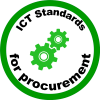The contents included in this section are DRAFTS and are under review.
eGovernment refers to the delivery of national or local government information and services via the Internet or other digital means.
eGovernment uses digital tools and systems to provide better public services to citizens and businesses. Effective eGovernment can provide a wide variety of benefits, including more efficiency and savings for governments and businesses, increased transparency, and greater participation of citizens in political life.
While Information Communication Technologies (ICTs) are already widely utilised by government bodies, eGovernment involves much more than just the technical tools. It also involves rethinking organisations and processes, and changing behaviour so that public services are delivered more efficiently to people. If implemented correctly, eGovernment enables citizens, enterprises and organisations to interact with government more easily, faster and at lower costs.
Sub Domains
Subdomains describe specific cases of the application of ICT solutions in the eGovernment domain. Selected cases for eGovernment are:
| eProcurement | Click to open |
While not considered a sub-domain, CEF Building Blocks are also included within the eGovernment domain. Based on existing formalised technical specifications and standards, the CEF building blocks are intended to facilitate the adoption of common technical specifications by public administrations.
The CEF building blocks offer basic capabilities that can be used in any European project to facilitate the delivery of digital public services across borders, and are based on existing formalised technical specifications and standards. Currently, the following building blocks are available:
| Building Block | Description |
|---|---|
| eDelivery | CEF eDelivery helps public administrations exchange electronic data and documents with other public administrations, businesses and citizens, in an interoperable, secure, reliable and trusted way. |
| eID | CEF eID helps public administrations and private online service providers to easily extend the use of their online services to citizens from other EU Member States. |
| eSignature | CEF eSignature helps public administrations and businesses to accelerate the creation and verification of electronic signatures. |
| eInvoicing | eInvoicing represents a clear example of how digital innovation can provide efficiencies and cost-cutting measures that are of tangible benefit to public administrations, citizens and businesses throughout Europe. |
| Translation | CEF Automated Translation is at the heart of the eTranslation service; helping European and national public administrations exchange information across language barriers in the EU. |
For the purposes of the public consultation, a DRAFT list of standards (version 2, update 31/03/2017) applicable to the topics treated in this domain has been created and can be dowloaded for perusal and comments.
The review and consultation stage aims at: adding/removing items, classifying items as standards/technical specifications/others following appropriate regulations.
You contribution will be much appreaciated. Please leave your feedback in the forum.

ETSI TR 119 164 (series) - Electronic Signatures and Infrastructures (ESI) Associated Signature Containers (ASiC) Testing Conformance and Interoperability

ETSI SR 019 020 V1.1.1 (2016-02) - The framework for standardization of signatures; Standards for AdES digital signatures in mobile and distributed environments

ISO/IEC 15459-6:2014 - Information technology – Automatic identification and data capture techniques – Unique identification – Part 6: Groupings

ISO/IEC 15459-5:2014 - Information technology – Automatic identification and data capture techniques – Unique identification – Part 5: Individual returnable transport items (RTIs)

ISO/IEC 15459-4:2014 - Information technology – Automatic identification and data capture techniques – Unique identification – Part 4: Individual products and product packages

ISO/IEC 15459-3:2014 - Information technology – Automatic identification and data capture techniques – Unique identification – Part 3: Common rules

ISO/IEC 15459-2:2015 - Information technology – Automatic identification and data capture techniques – Unique identification – Part 2: Registration procedures







